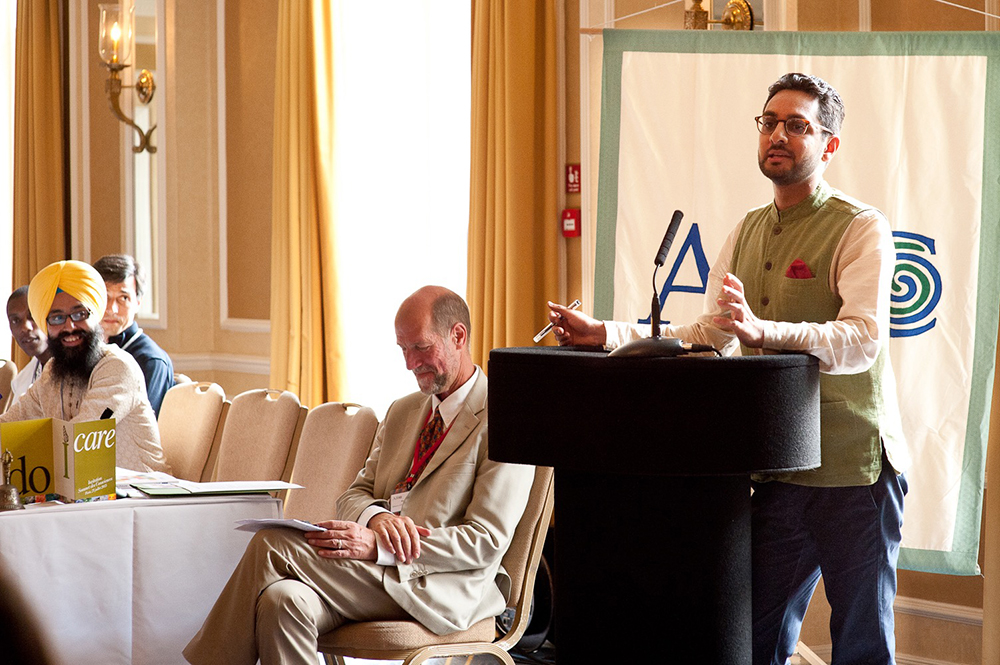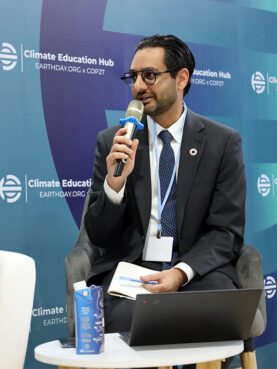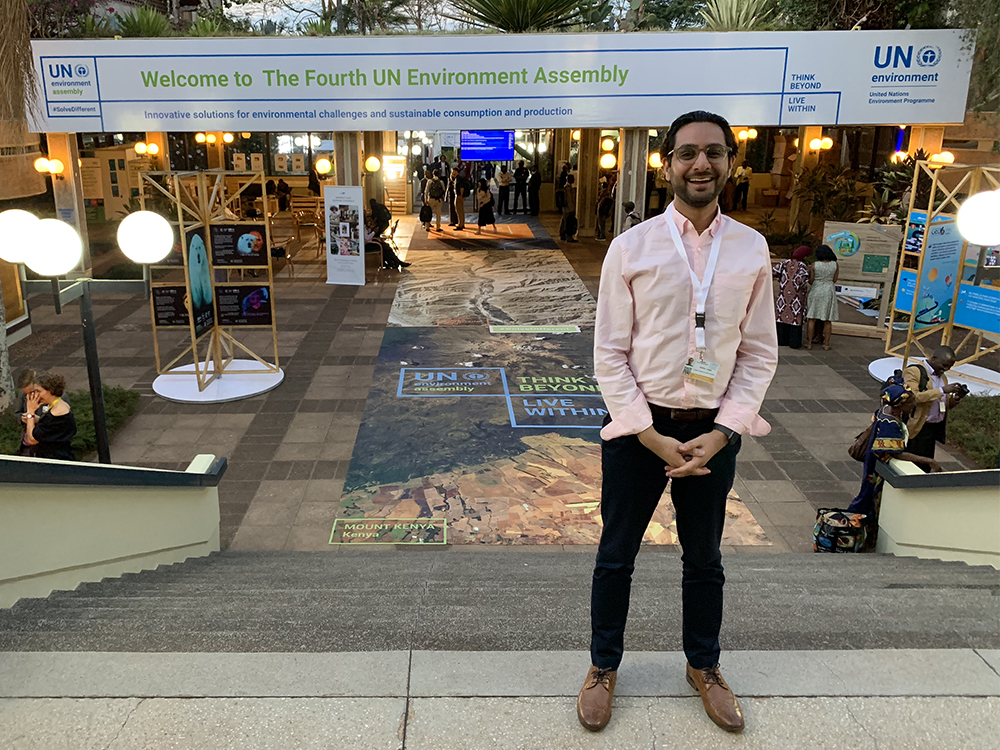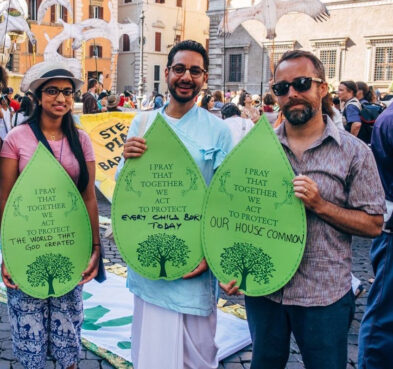An ‘old-school Hindu’ takes on the future of climate

Gopal Patel in 2015. Courtesy photo
MONTCLAIR, New Jersey (RNS) — Nearly two decades ago, at the age of 21, Gopal Patel moved into an ashram on the banks of the River Ganges to study the Bhagavad Gita, one of Hinduism’s foundational Scriptures.
One of just a handful of Indian students at a “very racist” high school in England, he said, Patel, now 39, found comfort in the epic conversation between the sacred text’s warrior prince Arjuna and the god Krishna.
“It made me go into myself and try to discern who I was as a person, my identity and my cultural background,” Patel said. “By the time I finished reading it, I was like, ‘I want to give my life to this.’”
Today Patel lives in Montclair, New Jersey, a short commute from New York City, and travels the world as the founder of Bhumi Global, an interfaith environmental movement rooted in Hindu principles. The organization, named for the Hindu goddess who represents Earth, focuses on the “triple crisis” of climate change, biodiversity loss and pollution.
RELATED: Gen Z Hindu Americans reckon with faith and politics
Tulasi Srinivas, a professor of anthropology and religion at Emerson College, says Patel’s experience as a diasporic Indian and “old-school Hindu” born in the U.K. and living in the U.S., bridges, meaning he applies both Eastern and Western approaches to the climate crisis.
“You need a big tent to do this kind of work. And to mobilize people globally, one can’t have technocratic answers only,” Srinivas said. “You need Indigenous answers, Hinduism, animism, stuff that we’re coming back to in a scientific way — yoga, flow and balance. Solutions can come from these areas.”
At the U.N. Biodiversity Conference in Montreal in December, Patel will work to galvanize faith-based groups around biodiversity — the variety of life on Earth — which he said often gets drowned out in the larger climate conversation.

Gopal Patel participates on a panel at COP27 in Sharm El Sheikh, Egypt, in Nov. 2022. Courtesy photo
The shared goal of the meeting is to leave Montreal with what has been called a “Paris moment” for nature, a global biodiversity framework that Patel and his allies have been working on.
“The faith community has been strong on climate for many years, but on biodiversity they haven’t,” Patel said. “This is the first time there has been a concerted effort by faith groups to engage.”
This year, a global research effort called the Forest Declaration Assessment found that while deforestation is slowing worldwide, the pace of change is not fast enough to achieve world leaders’ goal of net zero tree loss by 2030.
The World Wildlife Fund recently reported a nearly 70% decline since 1970 in the wildlife populations it tracks, “which,” he said, “comes at a time when we are finally beginning to understand the deepening impacts of the interlinked climate and nature crises and the fundamental role biodiversity plays in maintaining the health, productivity and stability of the many natural systems we and all life on Earth depend on.”
Patel makes it clear that Hindu environmentalists have known this all along. “Eastern traditions and Indigenous traditions are much more comfortable talking about the sacredness of a tree or a plant or a river,” he said. “That’s why I gravitate to biodiversity work. I felt like in the climate space I wasn’t able to bring my whole Hindu self into that. All these trees and everything, I can look at them and talk about them in a way that in the climate space, you can’t have those kinds of conversations.”
Patel is an initiated student in the Vaishnav lineage of Hinduism. His teacher is Radhanath Swami, an American monk and spiritual activist.
Sitting at an Ethiopian restaurant in Montclair earlier this year, Patel recalled his teacher initiating him with a new name, Gopal Lila Das.
“Das means servant,” he explained. “Gopal is a name that you give to Krishna as he looks after cows, and Lila means ‘the activities of.’ In Hindu theology, the cow is the representation of the earth. So he gave me that name, ‘the servant of someone who looks after the planet.’”
At that time, Patel had just begun organizing the project that eventually became Bhumi Global, which he founded in 2009. “Sometimes it’s said that when the guru gives you a name, it means there’s a destiny there waiting for you to live up to, but I don’t think he knew that. It’s kind of interesting that my life has turned into trying to care for the environment.”

Gopal Patel at the 4th UN Environment Assembly in Nairobi, Kenya, in March 2019. Courtesy photo
In late October, Bhumi Global hosted its first international summit, a virtual two-day event in partnership with the U.N.’s Faith for Earth Initiative. Patel called the gathering a proof of concept for being able “to convene a variety of voices and perspectives” and hopes to host in-person summits in future years.
Iyad Abumoghli, director of the initiative, underscored the “convincing and convening power” of religious leaders in the climate movement.
“Member states cannot alone achieve the Sustainable Development Goals or the targets on climate change and biodiversity, so we need all hands on deck,” Abumoghli said. “You will find faith leaders in every corner of the world. There is a Hindu in every country. There is a Muslim everywhere. So you have an agent of change wherever you go that is unmatched.”
He continued, “Religions actually talk to the hearts of the people before they talk to the minds of the people. Whatever religious leaders say, we say amen, we bow and we accept and we follow.”
With 1.2 billion adherents worldwide, Hinduism is the faith of approximately 15% of the world’s population. Abumoghli pointed out that some of the world’s largest companies are now led by CEOs of Indian origin, many of them Hindu, who hold influence over how green their organizations will be.

Gopal Patel, center. Courtesy photo
Patel said he is mindful of rising Hindu nationalism in India but has gone to great lengths to separate his work and that of the Bhumi community from those politics.
“I’ve made a conscious decision to not bring the politics of India into the politics of the diaspora,” he said. “I really strongly believe Hindus in the West, and wherever they are in the world, have to define themselves based on where they’re living, not what’s going on in another part of the world where they may not have any connection other than ancestrally.”
“And so, I’m concerned about: How does the Hindu community show up in the United States? How does it show up in Europe? How does it show up in other parts of the world? For me, I was born in England, I’m currently living in the U.S., I’m most likely going to die in the West. Right? India is a place of pilgrimage, primarily, for me.”
Karenna Gore, founder and executive director of Center for Earth Ethics at Union Theological Seminary, met Patel in 2014 while she was a seminary student. They appeared on panels together over the next few years, and Patel ultimately joined the center as a senior adviser.
RELATED: Can religion and faith combat eco-despair?
“He’s very good at understanding how the U.N. works, how the NGO ecosystem works and where the opportunity is for change,” Gore said.
She said Patel has a reputation for staying true to himself and his Hindu values while navigating the paradoxes of a global development community still dominated by the West and a lingering colonial legacy of conquest and exploitation.
“He has a clarity of mind and heart about what’s important in this work. He doesn’t allow that to be commandeered by the politics of the movement,” said Gore. “Fundamentally, he loves truth. You can tell his accountability is ultimately to a higher dimension, and he’s not one for machinations that would betray that.”
This story was produced in part by the Spiritual Exemplars Project led by University of Southern California’s Center for Religion and Civic Culture. Gopal Patel founded Bhumi Global, an interfaith environmental movement rooted in Hindu principles and named for the Hindu goddess who represents Earth. His focus is on the “triple crisis” of climate change, biodiversity loss and pollution.




